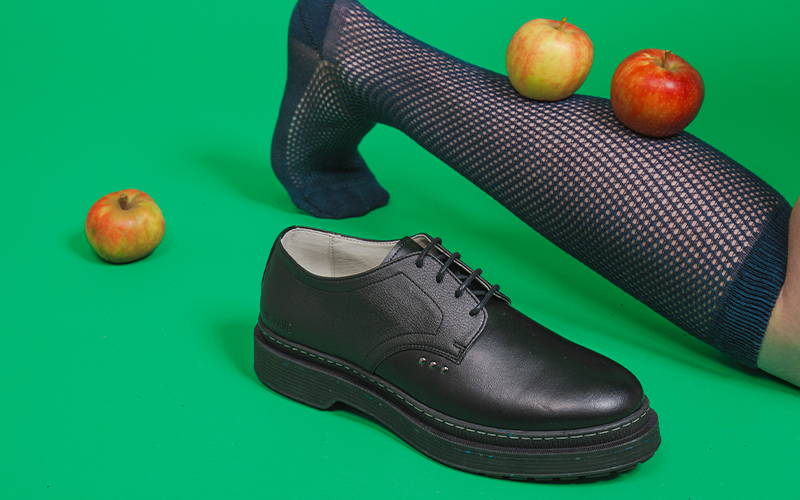How does Vegan Leather Age? Complete Guide

How does vegan leather age?
Vegan leather has enjoyed a meteoric rise in recent years in the fashion sector, attracting increasing attention thanks to its ecological (less CO2 emissions and more water-efficient) and ethical properties. Today's consumers are turning to a more sustainable, environmentally-friendly alternative, and vegetable-based leather is emerging as both an innovative and responsible solution. Unlike traditional leather, which comes from animal skin, vegan faux leather is inherently cruelty-free and animal-friendly, offering an ecological and animal-friendly alternative. With the rise of environmental concerns, this material has won over consumers for an ethical, environmentally-friendly product.

Innovative materials such as Piñatex (made from pineapple fibers) and AppleSkin (from apple waste) embody this new natural trend. These non-animal materials are part of a cruelty-free approach to animal welfare, while meeting the highest standards of quality, durability and sturdiness. Brands are embracing these new, more natural, plant-based products, proving that elegance and ethical fashion can coexist.
But what about the ageing of this new material? Is it as natural and plant-based as is claimed? and as durable and resistant as traditional leather skins? Here, we explore the different alternatives, their longevity and care.
Explore Vegan Shoes
Discover Vegan Sneakers
Definition and Types of Vegan Leather
Vegan leather is a synthetic material that resembles leather, but is free from animal products. It is vegetable-based. It comes in many forms, made from eco-friendly, recycled and sustainable resources, making the materials used an environmentally friendly and vegan choice.

Piñatex (pineapple leather)
Piñatex, a faux leather made mainly from the fibers of pineapple leaves, is not only an environmentally-friendly product, but also incredibly resistant and robust. This plant-based product puts agricultural waste to good use, transforming an unused waste product into a noble material. The pineapple stems and leaves are boiled to remove the fibers, which are then woven into the fabric. Resistant and flexible, the resulting product is increasingly appreciated by fashion brands for its skin-like texture, water-saving properties and low environmental impact. It's a wear-resistant, water-efficient material, appreciated for its texture and authentic appearance.

Apple leather (AppleSkin)
AppleSkin, or apple leather, is another eco-friendly alternative. It is made from apple processing residues, such as peels and cores, which are blended with algae-based bio-sourced plastic to create a sustainable material. More water-efficient than a traditionally tanned leather skin, this product is appreciated for its suppleness, strength and ability to age well. It is strong and robust, yet supple, making it particularly popular in the accessories and apparel industries.

Mushroom leather (Muskin)
Mycelium-based Muskin is a natural vegetable leather with an exceptional suede-like texture. It is made from mycelium, a part of the mushroom that grows underground. A canvas, often made of cotton or polyester, is stretched across the mushroom bed, and the mushrooms grow through it. The material is then cut from the top and bottom of the canvas to produce a leather-like material. Natural, vegetable and artisanal, this faux leather is still in development, but it offers promising prospects that Adidas and Hermes are already using.
Production techniques and main manufacturers
The techniques used to manufacture vegan materials vary from one material to another. Companies such as Ananas Anam (creators of Piñatex) and Frumat (AppleSkin) focus on environmentally-friendly processes, making the most of recycled raw materials. These methods are often less energy-intensive, more water-efficient, less toxic and less polluting than those required for traditional leather chrome tanning.
Carefully crafted materials are designed to be high quality, strong, hard-wearing and capable of competing with real leather while respecting nature.

Piñatex (pineapple leather)

Pineapple fibers
Characteristics and durability of vegan leather
Vegan leather has physical characteristics that influence its longevity. By nature, it is designed to be robust, incredibly hard-wearing and strong, yet flexible and lightweight. Compared to animal leather, vegan leather is generally lighter and can be more or less supple, depending on the bases used. These properties enable synthetic vegetable leather to be used in the manufacture of quality products that meet the demands of today's consumers.
Traction strength
Piñatex and AppleSkin are two extremely tough materials. Piñatex, for example, has a strength comparable to that of animal leather, offering anti-scratch resistance that makes it durable for long-term use.
Air permeability
Vegan leathers like Muskin are naturally more breathable, while others made from recycled plastic may require treatments to improve their permeability, but they remain comfortable and fashionable, suited to contemporary designs.
In general, vegan leather tends to be less breathable than animal leather, especially when made from synthetic materials such as plastic. However, innovations such as mushroom-based Muskin, or specific treatments applied to vegan leathers such as AppleSkin, improve this property.
Flexibility
Materials such as AppleSkin apple leather and Piñatex pineapple leather offer excellent suppleness and flexibility, comparable to that of animal leather, while being lighter. This maintains wear resistance and comfort of use, particularly for accessories such as shoes and leather goods.
Discover all our
Discover all our
How does Vegan Leather age?
The aging of vegan leather depends on many factors. Some materials, such as Piñatex and AppleSkin, are renowned for their incredibly long-lasting resistance, while others, more sensitive to water or light, require specific care.
Light exposure
Like all materials, plant-based alternatives can be sensitive to discoloration from prolonged exposure to sunlight. However, some, such as Piñatex and AppleSkin, are less sensitive to fading, making them incredibly UV-resistant.
Humidity and climatic conditions
Water can have a negative effect on some types of natural materials. However, a material like AppleSkin is tough and can withstand wet conditions, provided it is properly cared for. To avoid damage, we recommend regular waterproofing of these materials to protect them from water.
Physical wear
Vegan leather, like Piñatex, is often scratch-resistant and abrasion-resistant. However, to prolong its original appearance, it is important to care for areas subject to frequent rubbing and to use specific products to refresh the material's appearance.
Vegan leather care
To maximize the durability of vegan leather, regular maintenance is crucial. There are simple, effective methods for nourishing, protecting and renovating these materials, guaranteeing their long-lasting, ethical performance.
Conservation and restoration
To preserve the original appearance of vegetable leather, it should be stored in a dry place away from direct light. Products can be restored with special balms that nourish and polish the leather surface, guaranteeing long-lasting durability.
Cleaning techniques
Gentle cleaners are recommended to care for vegan synthetic leather without damaging it. Special products that respect vegan materials enable effective cleaning without affecting texture or color. Polishing gently with a soft cloth after cleaning will help refresh and protect the material.
Waterproofing
Waterproofing with the regular application of an anti-stain waterproofing spray is essential to protect vegan leather from water and stains. This preserves the original appearance and ensures a long product life.
Ecological benefits of Vegan Leather
A plant-based alternative material offers numerous environmental advantages. Its production generates less CO2 than that of animal leather (greenhouse gas emissions due to intensive livestock farming). It consumes less water, and like Piñatex or AppleSkin, is made from agricultural waste such as pineapple leaves or apple residues, helping to reduce our waste for a more sustainable and circular fashion. Vegan leather also helps preserve biodiversity by limiting the destruction of natural pasture habitats and reducing the use of chemicals that pollute water.
Let's not forget that real animal skins are not completely usable, they reflect the life of the animal (non-exploitable parts, animal scars, defects...). These skins generate waste, whereas vegan leather is a quality material that can be exploited in its entirety, without creating scraps or rejects that cannot be exploited or recycled by the industry.
This animal-free faux leather industry is ethical and animal-friendly, perfect for consumers looking for a cruelty-free quality product to use on accessories or clothing.
Richard Wool, professor at the University of Delaware, talks about his work on designing greener materials, for which he received an award from the Environmental Protection Agency.
The professor died in 2015, leaving his work unfinished, but we're proud to use materials he imagined.
Innovations and Trends in Vegan Leather
The vegan leather alternatives sector continues to reinvent itself. New innovations, such as biofabrication and the use of synthetic or composite materials, enable the creation of even more robust and durable materials. Modern, elegant materials are being developed for products that combine contemporary design with respect for the environment.
Numerous possibilities are currently being explored, including corn, tomato, grape, cactus, mango, eucalyptus and cork, not to mention recycled textiles made from marine plastic waste by the @SEAQUAL INITIATIVE organization.

Cactus Leather

Ecalyptus Leather

Fruit leather base
Highlighting ME.LAND products
The ME.LAND brand offers several alternatives to real leather: a range of eco-responsible sneakers or eco-responsible shoes, recycled and vegan sneakers or vegan shoes. It's a committed footwear brand. It's true, why produce again what already exists? ME.LAND uses waste materials to recycle them, and innovative materials to design a product that is both durable, comfortable and respectful of the planet.
Although recently developed by the industry, vegan faux leather offers a promising synthetic alternative to traditional leather hides. Its ageing depends on many factors, but with proper care it can rival animal leather in terms of durability and aesthetics. Its ecological advantages - less carbon emissions, less water use... - also make it a must-have product for more sustainable fashion, to accessorize your look and express your fashionable, chic style.
FREE SHIPPING
Free shipping all over France and Europe
from 80 €
EASY CONTACT
Contact us by email
WE PLAY LOCAL
Designed in Paris, manufactured in Italy or Portugal, available worldwide
SECURED PAYMENT
Visa, Master Card, Paypal ...










